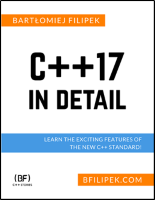Speeding up Pattern Searches with Boyer-Moore Algorithm from C++17--Bartlomiej Filipek
Did you know it?
Speeding up Pattern Searches with Boyer-Moore Algorithm from C++17
by Bartlomiej Filipek
From the article:
With C++17 you can now use more sophisticated algorithms for pattern searches! Now, you’ll have more control and a promising performance boost for many use cases...


 ACCU’s Overload journal of August 2018 is out. It contains the following C++ related articles.
ACCU’s Overload journal of August 2018 is out. It contains the following C++ related articles.